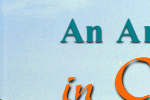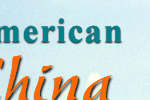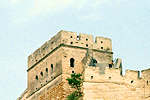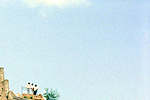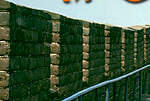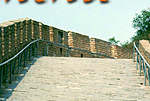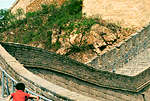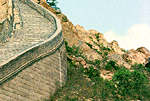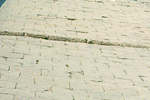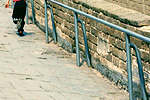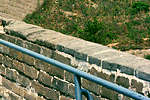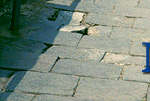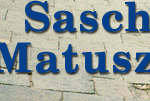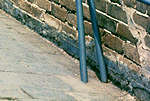|
Slowly,
collossal China has shifted its weight and taken somewhat of a stand
on the two rogue nation vs. superpower crisis currently holding
the world's attention. China's stance, inevitably, has placed it
in opposition to the superpower – but not exactly pro-rogue.
China has backed France and Germany (and Russia, to a certain extent)
in calling for an extension of the inspections and a strict adherence
to – gasp – the law, as stated in the UN Charter, Resolution
1441 (however vague, a smoking gun is still needed for those "serious
consequences" to come into being) and, ironically, the US Constitution
itself.
France and Germany have shown a little backbone, which has earned
them boos and hisses from the lackies of the world – those nations
dependent on handouts and favors from on high. These two pillars
of the EU have done the unspeakable and supported a Third World
nation instead of a "traditional ally" – for China, a traditional
ally of the broke and ex-communist, the reaction in the West has
been cautious for two important reasons.
One, China's good will is supposedly still needed to defuse the
North Korean crisis. Two, a harsh reaction may push China into voting,
instead of merely abstaining as usual. And of course, as economic
golden child of the future, China can now get away with opposing
"bad policy" as the People's Daily put Bush's
idea to ignore Resolution 1441 and start dropping bombs.
Bad policy and bad planning in the US Administration aside, China
has an interest in a peaceful resolution to both crises. Oil to
the west and trade to the east are both threatened by the spectre
of war. Yet China may have played its cards at precisely the right
moment concerning Iraq: NATO and the EU are both unable to agree
on a course of action (inspections or war) and France and Germany's
defection has kept America preoccupied. China then slides off of
the fence under cover of the infighting and the open "mutiny"
by the two European powers.
The threat of a China veto and the need for China's assistance with
North Korea alone will not be enough. If war is to be averted, a coalition,
led by Germany and France and supported by China (and perhaps Russia),
combined with domestic and international antiwar demonstrations,
could provide a strong enough deterrent to Bush's Administration
for unilateral action.
China's words on the North Korean situation have not indicated any
action or actual stance, but in a meeting Thursday with South Korea's
envoy Lee Hae-chan, Vice Premier Qian Qichen declared that the PRC
and the ROK are of one voice concerning the crisis. This is what
Qian says every time he meets an envoy from somewhere. The difference
is that the ROK's policy envisions Sunshine on the Peninsula and
a strengthening of various types of contact between the two Koreas.
Kim Dae Jung's policy may have been founded on a dream of eventual
reunification. The people of the ROK increasingly resent and blame
the US for the current crisis and the government of incoming President
Roh Moo-hyun has stressed the importance of cross-border reconciliation.
The US may not be anti-reunification, but peace and stability on
the peninsula negates the need for 100,000+ American troops in Korea,
Japan, Okinawa, the Philippines etc.
The US and IAEA's move to place the issue before the Security Council
may lead to sanctions (and possibly war) and skips over the talks
that could have taken place at a regional level. Although the US
may see this as a step away from unilateral action, the world sees
the Security Council and the UN as powerless before the US.
How can the US expect the world to think anything else after a vaguely
worded Resolution 1441 was railroaded through, Guernica
was covered up and France and Germany's stance was met with American-led
scorn?
Before September 11, when China was the main competitor, dominance
of the Asia-Pacific was the bone both nations (the US and the PRC)
were supposedly fighting over. Bush's incautious words and poor
preparation for a serious response to those words has placed the
US in the situation of having to dominate through intimidation,
force and fear – exactly what China was accused of planning for the
East Asian nations.
China, by echoing the sentiments of the Korean people and the new
ROK government but actually doing little as possible, assumes the
role of an interested yet respectful proponent of peace. Again,
under cover of the ROK's policy, China is able to slide off of the
fence and oppose the superpower while never endorsing the rogue.
China's leadership seems to have more vision than the Bush Administration,
which can't figure out what will happen after the bombs stop falling
and the Taliban is routed. The US was so quick to accept what was
thought to be China's hand in friendship after the 9/11 tragedy,
when in fact, it was politically necessary to do so for China. The
US then chased ghosts and demons and possible ties between them
while China remained focused on what truly was in the best interest
of China.
The US can use China's move off of the fence to slip out of war
and relegate the duties to the UN for a few months. This will give
everybody time to sit down and come to an agreement in the EU and
NATO and, if Bush still wants war, the Senators can have some more
time to dream up a post-war Iraq that is more than just a dream.
But of course, America's face is far too large, and the Administration's
politics too blunt to see such an opportunity as anything more than
a cop-out and a sign of weakness.
–Sascha
Matuszak
|
comments
on this article?
|
|
|
Please
Support Antiwar.com
Send
contributions to
Antiwar.com
520 South Murphy Avenue, Suite #202
Sunnyvale, CA 94086
or
Contribute Via our Secure Server
Credit Card Donation Form

Your
contributions are now tax-deductible
|
Sascha Matuszak
is a teacher living and working in China. His articles have appeared
in the South China Morning Post, the Minnesota Daily,
and elsewhere. His exclusive Antiwar.com column (usually) appears
Fridays.
Archived
columns
Sliding
off the Fence
2/14/03
Villages
in Transition
2/7/03
Smiles
and Nods and Handouts
1/31/03
China:
Straddling the Fence Just Right
1/17/03
Don't
Count on China
1/10/03
Merry
Christmas from China
12/27/02
Don't
Believe the Hype
12/20/02
Crackdown!
12/6/02
The
Incoming Hu Era
11/22/02
Jiang's
Theory Is a Smokescreen
11/15/02
The
Last Emperor
11/8/02
'We
Make You Play Bad Card'
10/25/02
The
Future of East-West Rapprochement
10/16/02
Lamenting
Funk Street
10/4/02
Tiananmen's
Legacy: The Forgotten Rebellion
9/21/02
Deciphering
the Chinese Smile
9/13/02
Why
China Can Disregard US Anger
9/7/02
Arming
the World: What the US Fears
8/30/02
What
Taiwanese Fear
8/23/02
What
Military Might?
7/26/02
Protection
7/10/02
Ties
That Bind
6/21/02
Tight
Spot
6/6/02
Fake
Friendships
3/28/02
1.3
Billion Problems For China
3/8/02
China's
New Post-9/11 Status
2/21/02
Soybeans
2/1/02
Patriotism
1/25/02
Room for Growth
1/19/02
No Peacemaker
1/11/02
Back in the USA
1/4/02
Missing the Boat?
12/14/01
Sweep 'Em Off the Streets
12/7/01
Chinese Embrace Progress
11/30/01
Risk
and Promise
11/9/01
Standing
Aloof?
11/5/01
China's
Afghan Agenda
10/26/01
New
War May Reveal New Superpower, Part II
10/9/01
New
War May Reveal New Superpower
10/3/01
A
Chance for a New Friendship?
9/25/01
Watching
the Disaster
9/18/01
Cheating
as a Way of Life
9/11/01
China's
Internet Generation
9/4/01
China's
Expansionism
8/28/01
Free
Markets or Supermarkets
8/14/01
Trailblazing
8/7/01
Too
Much Face
7/27/01
Olympic
Pie
7/19/01
Culture
of Pollution
7/10/01
Sailing
Towards World Significance
7/3/01
China's
Youth Revolution
6/19/01
China
on the Road to Capitalism
6/5/01
An
American in China
5/15/01
On
the Street in China: A Report
4/13/01
|
